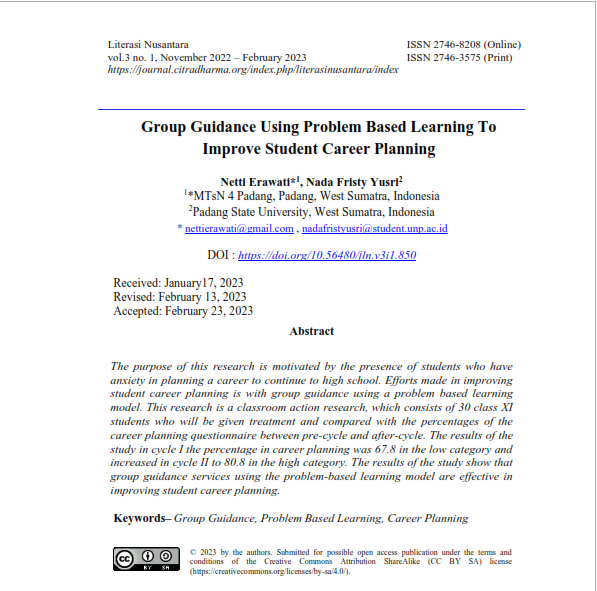Group Guidance Using Problem Based Learning To Improve Student Career Planning
DOI:
https://doi.org/10.56480/jln.v3i1.850
 Abstract View:
Abstract View:
90
 PDF downloads:
PDF downloads:
16
Keywords:
Group Guidance, Problem Based Learning, Career PlanningAbstract
The purpose of this research is motivated by the presence of students who have anxiety in planning a career to continue to high school. Efforts made in improving student career planning is with group guidance using a problem based learning model. This research is a classroom action research, which consists of 30 class XI students who will be given treatment and compared with the percentages of the career planning questionnaire between pre-cycle and after-cycle. The results of the study in cycle I the percentage in career planning was 67.8 in the low category and increased in cycle II to 80.8 in the high category. The results of the study show that group guidance services using the problem-based learning model are effective in improving student career planning.
References
Afdal, A., Suya, M., Syamsu, S., & Uman, U. 2014. Bimbingan Karir Kolaboratif dalam Pemantapan Perencanaan Karir Siswa SMA. Jurnal Konseling dan Pendidikan, 2 (3): 1-7.
Agustiani, H. 2009. Psikologi Perkembangan: Pendidikan ekologi, kaitannya dengan konsep diri dan penyesuaian diri remaja. Bandung: Refika Aditama.
Ahmad, S. 2013. Paradigms of Quality of Work Life. Journal of Human Values, 19 (1): 73-82.
Bardick, A., D., Bernes, K., B., Magnusson, K., C., & Witko, K., D. 2004. “Junior High Career Planning: What student want”. Canadian Journal of Counselling/Revue canadienne de counseling, 38 (2).
Gladding, T. S. 2012. Konseling Profesi yang Menyeluruh. Terjemahan oleh Yuliana Susanti. 2012. Jakarta Barat: Indeks.
Hurlock. E. B. 1980. Psikologi Perkembangan: Suatu pendekatan sepanjang rentang kehidupan (Edisi Ke Lima). Terjemahan oleh Istiwi Dayanti dan Soedjarwo. 1996. Jakarta: Erlangga.
Hidayati, R. 2015. “Layanan Informasi Karier Membantu Peserta Didik dalam Meningkatkan Pemahaman Karier”. Jurnal Konseling Gusjigang, 1 (1).
Isaacson, L., E. 1985. Career Information in Counseling and Career Development 4th edition. Massachusetts: Allyn and Bacon, Inc.
Millar, R., & Shevlin, M. 2001. “Predicting Career Information: Seeking behavior of school pupils using the theory of planned behavior”. Journal of Vocational Behavior, 26 (42).
Prayitno. 2012. Seri Panduan Layanan dan Kegiatan Pendukung Konseling. Padang: UNP Press.
Rusman. 2011. Model-Model Pembelajaran: Mengembangkan profesionalisme guru. Jakarta: Rajawali Pers.
Winkel, W. S., & Hastuti, M. M. S. 2013. Bimbingan dan Konseling di Institusi Pendidikan. Jakarta: Media Abadi.
Winter. 2010. ”Career Development”. Australian Journal Of Career Development, 19 (2): 41-48.
Wulandari, B., & Surjono, H. D. 2013 “Pengaruh Problem Based Learning terhadap Hasil Belajar Ditinjau dari Motivasi Belajar PLC di SMK”. Jurnal Pendidikan Vokasi,, 3 (2): 178-191.
Yamin, M. 2012. Desain Baru Pembelajaran Konstruktivistik. Jakarta: Referensi.

Downloads
Published
How to Cite
License
Copyright (c) 2023 Netti Erawati, Nada Fristy Yusri

This work is licensed under a Creative Commons Attribution-ShareAlike 4.0 International License.
Copyright Notice
Authors who publish with this journal agree to the following terms:
- Authors retain copyright and grant the journal right of first publication with the work simultaneously licensed under a Creative Commons Attribution-ShareAlike 4.0 International License that allows others to share the work with an acknowledgment of the work's authorship and initial publication in this journal.
- Authors are able to enter into separate, additional contractual arrangements for the non-exclusive distribution of the journal's published version of the work (e.g., post it to an institutional repository or publish it in a book), with an acknowledgment of its initial publication in this journal.
- Authors are permitted and encouraged to post their work online (e.g., in institutional repositories or on their website) prior to and during the submission process, as it can lead to productive exchanges, as well as earlier and greater citation of published work (See The Effect of Open Access).

This work is licensed under a Creative Commons Attribution-ShareAlike 4.0 International License.





























